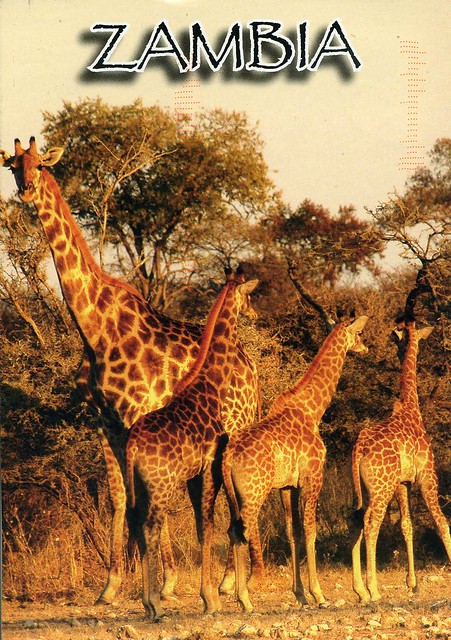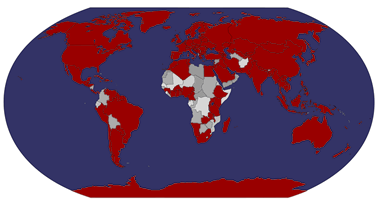
I was already vaguely familiar with Zambia as Matt's older sister Rachel used to work there some years ago. I'm not sure in what capacity, I think she was doing some sort of volunteer work there. I don't know so much because I didn't yet know Matt when she was there.. I've just heard stories (and seen a cool handmade postcard she sent to her family from there ;)). I sometimes think it might be nice to do volunteer work somewhere like Zambia, but that's not really a possibility now that I'm not single anymore, and life would just get in the way too much. That, and I've got the impression that you'd still have to pay for your travel to the destination and back, and possibly your living expenses there as well so it's not like I could afford it anyway.
This postcard is from a Taiwanese volunteer worker in Zambia (it seems like a lot of Taiwanese postcrossers are doing volunteer work abroad?!). Zambia is a landlocked country in Southern Africa. The neighbouring countries are the Democratic Republic of the Congo to the north, Tanzania to the north-east, Malawi to the east, Mozambique, Zimbabwe, Botswana and Namibia to the south, and Angola to the west. The capital city is Lusaka, located in the south-central part of the country. The population is concentrated mainly around the capital Lusaka in the south and the Copperbelt to the northwest. Zambia has a tropical climate and consists mostly of high plateau, with some hills and mountains, dissected by river valleys.
Zambia has been inhabited for thousands of years by hunter-gatherers, gradually leading to a multiethnic country. After visits by European explorers starting in the 18th century, Zambia became the British Colony of Northern Rhodesia towards the end of the nineteenth century. This was achieved through consessions and agreements between local paramount chiefs and representatives of the British Empire. For most of the colonial period, the country was governed by an administration appointed from London with the advice of the British South Africa Company.
On 24 October 1964, the country declared independence from the United Kingdom and prime minister Kenneth Kaunda became the first head of state. The new name of Zambia was derived from the Zambezi river (Zambezi may mean "God's river") which flows through the western region of the country.
Zambia is one of the most highly urbanized countries in sub-Saharan Africa with 44% of the population concentrated in a few urban areas along the major transport corridors, while rural areas are sparsely populated. Unemployment and underemployment in urban areas are serious problems, while most rural Zambians are subsistence farmers. The population comprises approximately 72 ethnic groups, most of which are Bantu-speaking.

I couldn't find any info on the stamp so all I know is what I can read on the stamp - issued in 2000, showing the Sacred Ibis.



 Maroon
Maroon 










































































































































































2 comments:
Hi,
That is one heck of a nice postcard.
Cool stamp , too.
Glenn
It's certainly something you don't receive every day!
Post a Comment